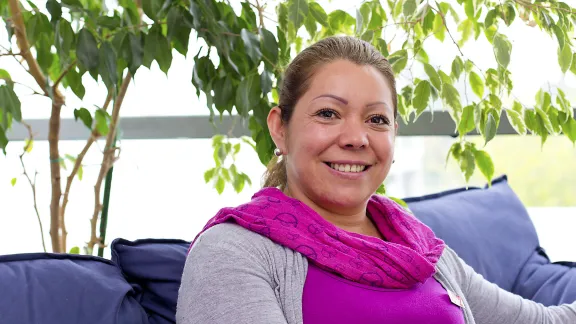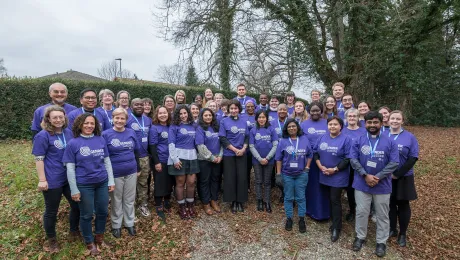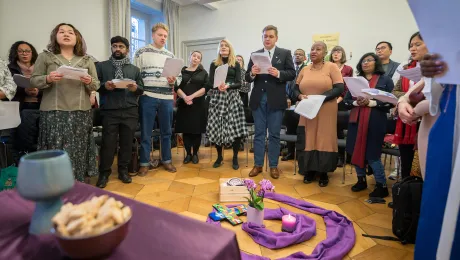
Ros Mary Rincon, coordinator of HIV and AIDS work at IELCO. Photo: LWF/Maximilian Haas
Lutheran Church Support to People Living with HIV and Marginalized Women
(LWI) – On the first Saturday of each month, about 40 to 50 people meet at the Redeemer Congregation of the Evangelical Lutheran Church of Colombia (IELCO) in Bogotá. Often, there is a new face joining in the informal conversations about daily life, concerns in the community and finding out more about the group.
“Walking Together,” an occasional gathering of a handful of people started ten years ago, has grown into a strong support group of and for people living with HIV and AIDS in the Colombian capital. Membership is open to anyone wishing to join irrespective of gender or faith affiliation, and for many individuals and families affected by HIV, it is the only place they can find assistance.
“We strive for zero discrimination on who can be a member of the group so that we can reach our goal of zero new HIV infections in our communities,” says Ros Mary Rincon, coordinator of IELCO’s HIV and AIDS work, explaining the church’s response to the goals of the 2011-2015 global HIV campaign.
The Lutheran church AIDS work includes awareness raising on how to avoid new HIV infections; encouragement to people living with HIV to live in dignity and claim their rights; and sustained networking and advocacy with local and international civil society organizations and the government.
“The efforts by the Redeemer congregation are paying off, and other churches are requesting support from the Lutheran church to start such support groups,” Rincon said in an interview with Lutheran World Information (LWI). Colombia has an estimated 190,000 people living with HIV, a majority of who are vulnerable women as they live in poverty, experience sexual and gender-based violence and have limited access to health care, she added.
Rincon was among representatives of 27 civil society organizations who presented the non-governmental organizations (NGOs) shadow report for Colombia’s examination at the 56th session of the United Nations (UN) Committee on the Elimination of Discrimination against Women (CEDAW), 30 September - 18 October, in Geneva, Switzerland. The report titled “A Look at Women’s Rights in Colombia,” highlighted the impact of sexual and gender-based violence on women and the right to health for people living with HIV in a country that has experienced five decades of armed civil conflict.
The Lutheran World Federation (LWF) supported Rincon’s participation at the CEDAW committee discussions through collaborative work with IELCO’s women’s ministry and the Women in Church and Society (WICAS) program of the LWF Department for Theology and Public Witness.
Holding Government Accountable
The CEDAW committee sought response from the government on various commitments, including its efforts to revise laws that currently make it possible for medical practitioners to impose sterilization on women or girls with disabilities, and those living with HIV.
Progress was being made in strengthening the respective legal framework, government representatives said, but admitted that high levels of domestic and sexual violence exist in Colombia’s context and that women’s reproductive rights are abused.
Rincon welcomed the committee’s call on the government to amend and develop the regulatory framework as well as guidance to ensure that sterilization is carried out with the free and informed consent of all women.
Referring to her own experience, the mother of a four year-old daughter said, “If I was not aware of my rights as a woman living with HIV, the doctors would have forcibly sterilized me in the early stages of my pregnancy.” Today, Rincon’s work with IELCO includes support to vulnerable women struggling to build sustainable livelihoods “as they also deal with gender and sexual violence, fear, shame and ignorance, and their obligation to provide for and protect their families especially children.”
Prevent, Investigate and Punish
The armed conflict in Colombia has displaced up to 5 million people, over 10 percent of the population, mostly women and children. The CEDAW committee underlined that “while all civilians are adversely affected by armed conflict, women and girls are primarily and increasingly targeted by the use of sexual violence.”
Citing surveys by the non-governmental organizations Profamilia and the National Institute of Legal Medicine and Forensic Sciences (NILMFS), the NGOs’ shadow report stated that sexual violence is perpetrated by all armed groups involved in the Colombian conflict.
Still, Rincon expressed hope that peace negotiations between the government and the Revolutionary Armed Forces of Colombia (FARC), begun in October 2012 in Norway and currently continuing in Cuba, will result in a total cessation of conflict.
But, as underlined in the CEDAW committee report, for most women, the violence does not stop with the signing of a peace agreement. It often increases in the post-conflict setting and is exacerbated by failure to “prevent, investigate and punish all forms of gender-based violence,” Rincon emphasized
Referring to some examples in the shadow report, the IELCO representative noted that the cases of sexual violence reported in 2010 and 2011 included 84 percent women victims compared to 16 percent men: “a ratio of 1 man for every 5 women.” She underlined the assertion by NILMFS that “The impunity of these crimes is 98 percent, [a figure that] goes together with a high percentage of underreporting, the invisibility of these crimes and the constant fear to denounce them.”
Advocacy
Rincon expressed gratitude to the LWF for accompanying IELCO in its AIDS work and the struggle for women’s rights and gender justice. She said there is progress in many areas but “still so many challenges in breaking the culture of violence that has become commonplace in Colombia.”
At an LWF-coordinated meeting at the Ecumenical Center in Geneva, Rincon and Fabiola Tapasco, also from Colombia, shared their impressions about the CEDAW meeting, and churches’ work among marginalized women in the Latin American country. The 30 representatives from church-related organizations at the gathering discussed the challenges in protecting women’s rights, and how church organizations can strengthen ongoing support for peace and justice in the country.
Rincon added that stronger advocacy is needed also with churches, civil society and other UN platforms “to hold Colombia accountable for its obligations to the UN Convention on the Elimination of All Forms of Discrimination against Women, which it ratified in 1982.”
LWF’s presence in Colombia includes IELCO which has been a member church since 1966, and the Department for World Service country program.


